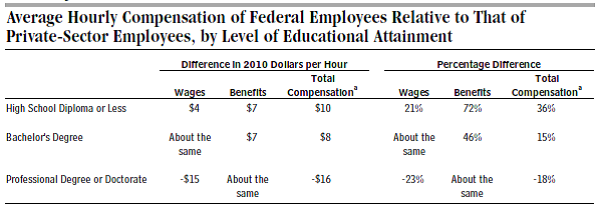During the height of the recession, right-wingers tried with some success to make a big deal out of public sector compensation. The depressed economy led to lower government revenues and thus deficits. Conservatives seized the moment to pretend that the deficits were really caused by sky-high public employee compensation. While that claim was obviously false, the accusations that public sector workers are overpaid became an issue of dispute. At the time, the Economic Policy Institute carried out a handful of state-specific studies, all of which tended to show that state public sector employees do not receive higher compensation than their private sector counterparts.
The Congressional Budget Office released a report today about the compensation levels of federal employees. In chart form, they found the following:

In total, federal government employees have 16% higher compensation, but the compensation statistics are stratified. Federal employees with high school degrees make significantly more than their private sector counterparts. Those with bachelor’s degrees also have higher compensation levels than their private sector counterparts. But very highly-paid workers — those with professional and doctoral degrees — actually make quite a bit less than their private sector counterparts.
In total then, the federal government has a much more egalitarian income distribution than the private sector, but pays more in aggregate. Conservatives may try to make a big deal out of this, but the rhetoric involved in their objections is always backwards. It is apparently true that a pay disparity exists between private sector workers and federal workers. That disparity probably should be eliminated. But that does not mean that federal workers should take a pay cut; it means that private sector workers should get a pay raise.
The pay disparity between federal workers and private sector workers is the consequence of four decades of virtually stagnant wages for all but the wealthiest private sector workers. Federal workers are not being overpaid; private sector workers are being underpaid. Closing the pay gap then should mainly involve empowering private sector workers to catch up to their federal worker counterparts, not dragging federal workers down.